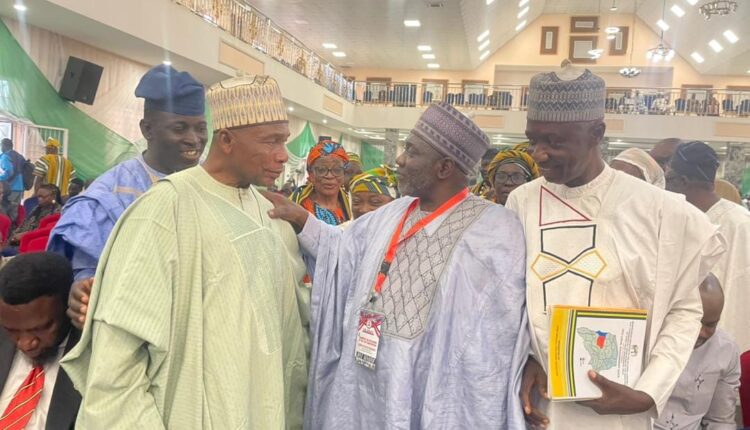Igala, Bassa Leaders Revive Okura State agitation at Senate Public Hearing in Jos
Amid chants of unity, hope, and historic justice, the long-sustained cry for the creation of Okura State roared back into national discourse on Friday, as traditional leaders, political figures, and advocates from Kogi East Senatorial District passionately addressed the Senate Constitutional Review Committee at its North Central public hearing held in Jos, Plateau State.
Presenting under the umbrella of the Okura State Movement, the delegation—led from the ancient palace of the Ata Igala in Idah—called for the urgent creation of Okura State out of present-day Kogi State, alongside the formal recognition of 14 additional local governments which they say are critical to ensuring fair governance and administrative equity in the region.
“This is not just a request. It is a revival of a promise long denied. It is about dignity. It is about development. It is about justice,” the group declared before a hall packed with senators, constitutional experts, and delegates from across the region.
The submission highlighted the irony of Kogi East’s political weight—home to the Igala and Bassa ethnic nationalities—being used against them. Though numerically dominant, the region’s population advantage has translated into disproportionate political representation, skewed development, and a feeling of being relegated in a state they helped form.
According to the delegation, the current configuration of Kogi State grossly underrepresents the East in terms of senatorial districts, federal and state constituencies, polling units, and local governments. In contrast to Kogi West and Central, Kogi East remains politically handicapped despite having a population of over three million and land area of 14,000 square kilometers.
“In 1963, we were 54% of Kabba Province. By 1991, we had been reduced to 46% through census manipulation. The result? Less federal attention, fewer political seats, and underdevelopment,” they explained.
Tracing their identity through time, the Okura State Movement narrated how the Igala Kingdom—one of Nigeria’s ancient civilizations—had been shuffled across state lines: from Kwara to Benue, and finally into Kogi in 1991. Since then, they say, the people have lived as strangers in a structure that never fully acknowledged their aspirations.
Their demand, first submitted to the Second Republic National Assembly in 1980, was even approved for a referendum in 1983, only to be dashed by the military coup that ousted the Shagari administration. “Other proposed states from that era have since been created. We remain in limbo,” they lamented.
The proposed Okura State would be made up of the existing nine local government areas in Kogi East—Ankpa, Bassa, Dekina, Ibaji, Idah, Igalamela/Odolu, Ofu, Olamaboro, and Omala—as well as 14 new councils that were approved by the Kogi State Assembly in 2002 and await federal constitutional backing. These include Ibaji East, Odane, Itobe, Igalogba, Ogugu, Imane, Ojoku, Enjema, Okura, Biradu, Mozum, Gboloko, Odolu, and Olla.
From abundant deposits of coal, barite, and petroleum to massive agricultural potential and a booming cashew export sector, the group insists Okura State is economically viable. They described the region as a key engine of national development that has been largely ignored.
“We are an oil-producing region. We are the largest producer of cashew nuts in Nigeria. We host coal reserves that feed industries across West Africa. And yet, we are treated as afterthoughts,” the delegation stressed.
They argued that with a capital at Idah, the cultural and historical seat of the Igala Kingdom, Okura State would fast-track local development, stabilize ethnic tensions, and return a sense of belonging to communities that have contributed immensely to Nigeria’s unity and strength.
The delegation was firm in stating that all legal and procedural requirements for state creation under Section 8 of the 1999 Constitution (as amended) have been fully met. These include support from the affected local governments, state legislature, and overwhelming grassroots backing.
They also asked the National Assembly to pass consequential legislation recognizing the 14 new local councils within the proposed state, citing administrative necessity and grassroots inclusion.
The Okura State Movement concluded with a passionate plea: “This is about restoring what history took from us. This is about giving a people their place—not just on the map—but in the soul of the Nigerian Federation. We have waited 45 years. The time is now.”
As constitutional debates continue to shape Nigeria’s future, the Okura State demand stands as one of the most enduring, organized, and emotionally resonant calls for restructuring—one that carries not just statistics, but a soul, a story, and a people.
The engine room powering the agitation is powered by the national Assembly representatives comprising of the senate Representing Kogi East in the senate, the House of Representatives member representing the Ankpa constituency Abdullahi Ibrahim Ali Halims and the representative for Idah Federal Constituency Hon. David Zacharias

